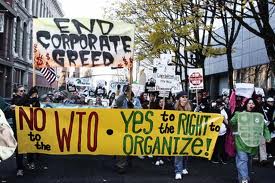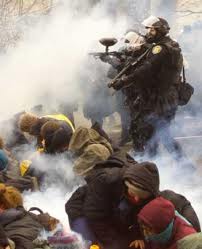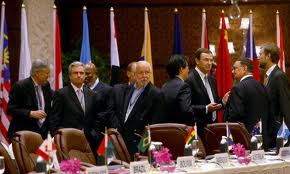 Business groups had hoped a new round would begin at WTO Ministerial meeting in Seattle in December 1999 and spent millions lobbying to that end. President Clinton had even promised to cancel the debts owed to the US by the poorest countries, particularly in Africa.
Business groups had hoped a new round would begin at WTO Ministerial meeting in Seattle in December 1999 and spent millions lobbying to that end. President Clinton had even promised to cancel the debts owed to the US by the poorest countries, particularly in Africa.
The Seattle host committee was chaired by Bill Gates, CEO of Microsoft and Philip Condit, CEO of Boeing and chair of the BRT’s Taskforce on International Trade & Investment. The host committee offered corporations various levels of access to negotiators and ministers according to their level of donation: ‘All emerald corporate donors, for example, which gave over a quarter of a million dollars, would receive special access to private events with top government and trade officials at the WTO meetings in Seattle.’
 However at the meeting the US and the EU could not agree on agricultural trade concessions and developing countries claimed that whilst they were having to open up their markets the affluent countries were not making similar concessions. Developing countries, sick and tired of being marginalized in the decision-making process, and encouraged by the vigorous street protests going on outside, refused to passively go along with any negotiated deal that they had not participated in.
However at the meeting the US and the EU could not agree on agricultural trade concessions and developing countries claimed that whilst they were having to open up their markets the affluent countries were not making similar concessions. Developing countries, sick and tired of being marginalized in the decision-making process, and encouraged by the vigorous street protests going on outside, refused to passively go along with any negotiated deal that they had not participated in.
As a result of the developing countries demands for greater participation, new guidelines were formulated for WTO negotiations that included: the need to inform all countries of informal consultations; giving those with an interest an opportunity to be heard; not assuming that one country represents other countries; and informing all countries of the outcome of informal consultations. However, in practice the only real change in subsequent negotiations was the inclusion of some less developed countries in some consultations.
 At the next ministerial meeting in Doha in 2001 developing countries again found themselves marginalized. However this time the US and the EU were more united. This was partly because of the efforts of the Transatlantic Business Dialogue (TABD).
At the next ministerial meeting in Doha in 2001 developing countries again found themselves marginalized. However this time the US and the EU were more united. This was partly because of the efforts of the Transatlantic Business Dialogue (TABD).
TABD develops policies that suit big business. The US and the EU then present them to the WTO as ‘done deals’. Public Citizen notes: ‘The TABD has been labelled the ‘new paradigm for trade liberalization’ by its proponents because it eliminates the ‘middle man’ from trade policy-making. That middle man is the U.S. and E.U. governments, and by extension, U.S. and E.U. citizens and consumer, labor and environmental NGOs.’
A major reason for the intransigence of the US and the EU in the negotiations was the pressure being put on them by business. Not only were various powerful business coalitions pushing for free trade to be expanded to incorporate free investment but the agribusiness lobby was well represented at Cancún. The US delegation alone included some 70 corporate advisers, including those representing the interests of agricultural corporations. These interests were also well represented on the EC delegation. In addition, some high level officials had backgrounds in agribusiness including the US Secretary of Agriculture and the chief US agricultural trade negotiator.
Whilst corporate advisors were included on many delegations and had access to negotiating documents, NGOs and civil society representatives were excluded. Those developing nations that tried to include them were pressured not to, according to an ActionAid report that cited Uganda and Kenya as examples. Similarly the UK criticized some EU countries for sharing too much information with civil society representatives.